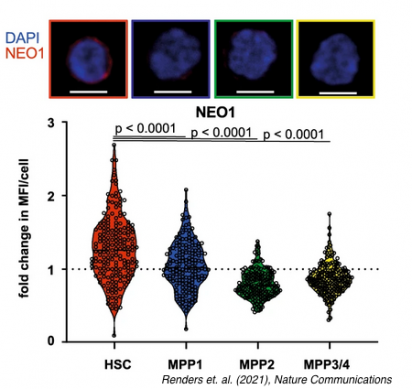
A characteristic feature of all stem cells is their ability to self-renew. But how is this potential maintained throughout life? Scientists at the German Cancer Research Center (DKFZ) and the Heidelberg Institute for Stem Cell Technology and Experimental Medicine (HI-STEM) have now discovered in mice that cells in the so-called "stem cell niche" are responsible for this: Blood vessel cells of the niche produce a factor that stimulates blood stem cells and thus maintains their self-renewal capacity. With the decades of life, the production of this factor ceases and blood stem cells begin to age.
The work was led by Simon Renders, a MD-PhD Student who carried out his PhD thesis in the HI-STEM lab.Read more:
- Original Publication: Renders, S., Svendsen, A. F., Panten, J., Rama, N., Maryanovich, M., Sommerkamp, P., Ladel, L., Redavid, A. R., Gibert, B., Lazare, S., Ducarouge, B., Schönberger, K., Narr, A., Tourbez, M., Dethmers-Ausema, B., Zwart, E., Hotz-Wagenblatt, A., Zhang, D., Korn, C., Zeisberger, P., Przybylla, A., Sohn, M., Mendez-Ferrer, S., Heikenwälder, M., Brune, M., Klimmeck, D., Bystrykh, L., Frenette, P. S., Mehlen, P., de Haan, G., Cabezas-Wallscheid, N.*, & Trumpp, A.* (2021). Niche derived netrin-1 regulates hematopoietic stem cell dormancy via its receptor neogenin-1. Nature Communications, 12(1), 608. 10.1038/s41467-020-20801-0
- DKFZ Press Release / DKFZ Pressemitteilung
